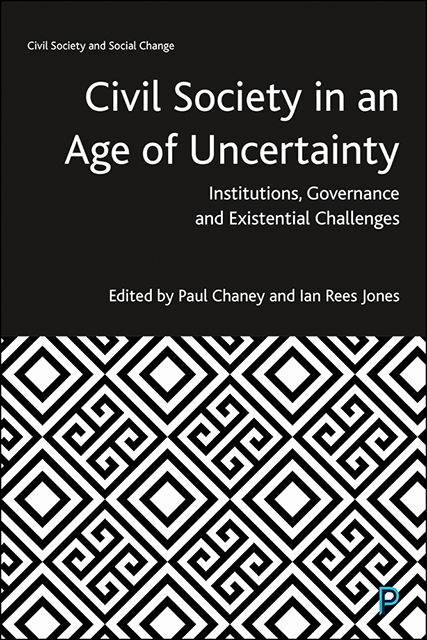Book contents
- Frontmatter
- Contents
- List of tables and figures
- Notes on contributors
- Acknowledgements
- 1 Introduction: Locating civil society
- 2 Existential challenges
- 3 Civil society and the governance of city region economic development
- 4 Civil society, pandemic and the crisis of welfare: exploring mixed economy models of welfare in domiciliary adult social care in a devolved UK
- 5 The contemporary threat to minority languages and cultures: civil society, young people and Celtic language use in Scotland and Wales
- 6 Digital threat or opportunity? Local civil society in an age of global inter-connectivity
- 7 Democratic decline? Civil society and trust in government
- 8 Xenophobia, hostility and austerity: European migrants and civil society in Wales
- 9 Meeting the challenge? Prospects and perils for civil society in the twenty-first century
- Index
1 - Introduction: Locating civil society
Published online by Cambridge University Press: 16 June 2023
- Frontmatter
- Contents
- List of tables and figures
- Notes on contributors
- Acknowledgements
- 1 Introduction: Locating civil society
- 2 Existential challenges
- 3 Civil society and the governance of city region economic development
- 4 Civil society, pandemic and the crisis of welfare: exploring mixed economy models of welfare in domiciliary adult social care in a devolved UK
- 5 The contemporary threat to minority languages and cultures: civil society, young people and Celtic language use in Scotland and Wales
- 6 Digital threat or opportunity? Local civil society in an age of global inter-connectivity
- 7 Democratic decline? Civil society and trust in government
- 8 Xenophobia, hostility and austerity: European migrants and civil society in Wales
- 9 Meeting the challenge? Prospects and perils for civil society in the twenty-first century
- Index
Summary
This volume explores a range of contemporary challenges facing civil society organisations in the early twenty-first century. As the following chapters reveal, each may arrest or subvert the beneficial effects of associative life and negatively impact upon governance, culture and welfare. The overall argument of this volume is the importance of civil society to individual and collective well-being, as well as the health of democracy. On the one hand, the following chapters note the resilience of civil society and its adaptability to meet uncertainties, yet on the other, we argue that civil society’s ability to prevail in the face of the existential challenges is far from assured. Rather, it is contingent in nature and requires ongoing vigilance, social self-organisation and criticality. A further strand of our argument underlines the point that while the contemporary ‘project’ to reconfigure the state might be normatively sound, its execution can be subverted by dogma, and the failure of political elites to listen and engage exogenous interests, as well as civil society organisations’ mistrust and lack of capacity to participate. Accordingly, this is the first of two short introductory chapters to this volume. Here we summarise core aspects of the history and theory associated with the concept of civil society. This is followed by a discussion of the key features of civil society in the nations of the UK. In the next chapter we summarise contemporary political and social changes and how these contribute to the existential challenges facing civil society today.
The concept of civil society has been variously advanced as: a corrective to the negative effects of neo-liberal, market-driven policies; an answer to the challenges of state down-sizing and declining welfare capacity; and a bedrock of democracy and good governance through which citizens can hold political elites to account. Moreover, it has been styled as a space where culture, identity and norms can be transmitted and valued. However, the reality is that, far from being a panacea, civil society is itself intimately wrapped up in the uncertainties of the age.
- Type
- Chapter
- Information
- Civil Society in an Age of UncertaintyInstitutions, Governance and Existential Challenges, pp. 1 - 18Publisher: Bristol University PressPrint publication year: 2022

